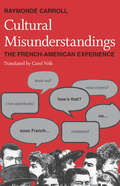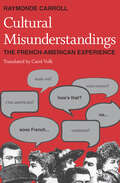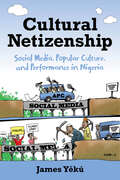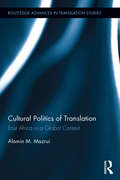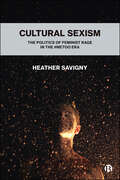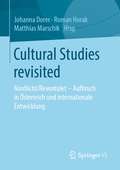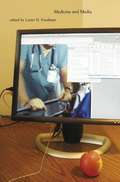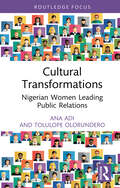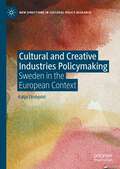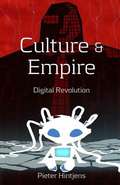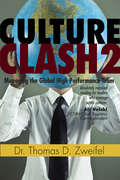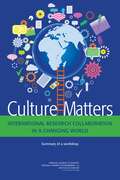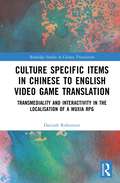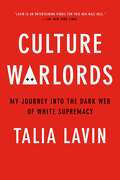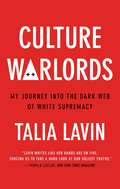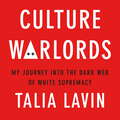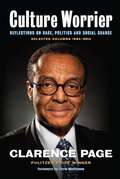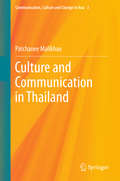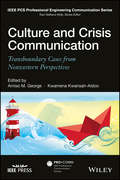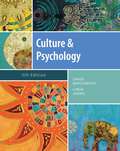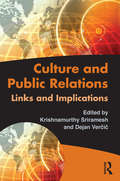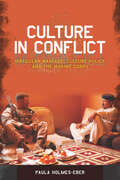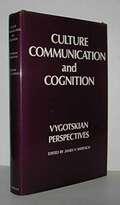- Table View
- List View
Cultural Misunderstanding: The French-American Experience
by Carol Volk Raymond CarrollMy studies in anthropology had not entirely prepared me. From something theoretical and exciting, anthropology abruptly became something difficult to live.
Cultural Misunderstandings: The French-American Experience
by Raymonde Carroll translated by Carol VolkRaymonde Carroll presents an intriguing and thoughtful analysis of the many ways French and Americans—and indeed any members of different cultures—can misinterpret each other, even when ostensibly speaking the same language. Cultural misunderstandings, Carroll points out, can arise even where we least expect them—in our closest relationships. The revealing vignettes that Carroll relates, and her perceptive comments, bring to light some fundamental differences in French and American presuppositions about love, friendship, and raising children, as well as such everyday activities as using the telephone or asking for information.
Cultural Misunderstandings: The French-American Experience
by Raymonde Carroll&“Full of colorful anecdotes…tells us a lot about the French but even more about ourselves.&”—Los Angeles Times This is an intriguing and thoughtful analysis of the many ways French and Americans—and indeed any members of different cultures—can misinterpret each other, even when ostensibly speaking the same language. Cultural misunderstandings, Raymonde Carroll points out, can arise even where we least expect them: in our closest relationships. With revealing vignettes and perceptive observations, she brings to light some fundamental differences in French and American presuppositions about love, friendship, and raising children, as well as such everyday activities as using the telephone or asking for information. &“An entertaining, informative book…often witty…a vital source for learning how to establish amity not only between the U.S. and France but among all the world&’s nations.&”—Publishers Weekly
Cultural Netizenship: Social Media, Popular Culture, and Performance in Nigeria
by James YékúHow does social media activism in Nigeria intersect with online popular forms—from GIFs to memes to videos—and become shaped by the repressive postcolonial state that propels resistance to dominant articulations of power? James Yékú proposes the concept of "cultural netizenship"—internet citizenship and its aesthetico-cultural dimensions—as a way of being on the social web and articulating counter-hegemonic self-presentations through viral popular images. Yékú explores the cultural politics of protest selfies, Nollywood-derived memes and GIFs, hashtags, and political cartoons as visual texts for postcolonial studies, and he examines how digital subjects in Nigeria, a nation with one of the most vibrant digital spheres in Africa, deconstruct state power through performed popular culture on social media. As a rubric for the new digital genres of popular and visual expressions on social media, cultural netizenship indexes the digital everyday through the affordances of the participatory web.A fascinating look at the intersection of social media and popular culture performance, Cultural Netizenship reveals the logic of remediation that is central to both the internet's remix culture and the generative materialism of African popular arts.
Cultural Politics of Translation: East Africa in a Global Context (Routledge Advances in Translation and Interpreting Studies)
by Alamin M. MazruiThis book is the first full-length examination of the cultural politics at work in the act of translation in East Africa, providing close critical analyses of a variety of texts that demonstrate the myriad connections between translation and larger socio-political forces. Looking specifically at texts translated into Swahili, the book builds on the notion that translation is not just a linguistic process, but also a complex interaction between culture, history, and politics, and charts this evolution of the translation process in East Africa from the pre-colonial to colonial to post-colonial periods. It uses textual examples, including the Bible, the Qur’an, and Frantz Fanon’s Wretched of the Earth, from five different domains – religious, political, legal, journalistic, and literary – and grounds them in their specific socio-political and historical contexts to highlight the importance of context in the translation process and to unpack the complex relationships between both global and local forces that infuse these translated texts with an identity all their own. This book provides a comprehensive portrait of the multivalent nature of the act of translation in the East African experience and serves as a key resource for students and researchers in translation studies, cultural studies, post-colonial studies, African studies, and comparative literature.
Cultural Sexism: The politics of feminist rage in the #metoo era
by Heather SavignyHow does gendered power work? How does it circulate? How does it become embedded? And most importantly, how can we challenge it? Heather Savigny highlights five key traits of cultural sexism – violence, silencing, disciplining, meritocracy and masculinity – prevalent across the media, entertainment and cultural industries that keep sexist values firmly within popular consciousness. She traces the development of key feminist thinkers before demonstrating how the normalization of misogyny in popular media, culture, news and politics perpetuates patriarchal values within our everyday social and cultural landscape. She argues that we need to understand why #MeToo was necessary in the first place in order to bring about impactful, lasting and meaningful change.
Cultural Studies revisited: Nordlicht/Revontulet - Aufbruch in Österreich und internationale Entwicklung
by Roman Horak Johanna Dorer Matthias MarschikDieses Buch präsentiert Cultural Studies, beginnend mit der österreichischen Aufbruchsstimmung und begleitet von internationalen Stimmen der Tagungsteilnehmer*innen in Tampere und Birmingham. Es zeigt die vielfältige Forschungswelt der Cultural Studies bis heute und schlägt Brücken in die Zukunft.Cultural Studies waren ein Versprechen und vielleicht auch eine wissenschaftliche Verheißung. Im wahrsten Wortsinn erschienen sie, als in Finnland die ersten internationalen Tagungen stattfanden, wie ein Nordlicht am Horizont: Revontulet. Die Crossroads-Konferenzen in Tampere (1996, 1998) und Birmingham (2000) waren für Wissenschaftler*innen der Beginn eines interventionistischen Wissenschaftsprojekts, das in Wien seinen Ursprung im Institut für Kulturstudien (IKUS) hatte.
Cultural Sutures: Medicine and Media
by Lester D. FriedmanMedicine and the media exist in a unique symbiosis. Increasingly, health-care consumers turn to media sources--from news reports to Web sites to tv shows--for information about diseases, treatments, pharmacology, and important health issues. And just as the media scour the medical terrain for news stories and plot lines, those in the health-care industry use the media to publicize legitimate stories and advance particular agendas. The essays in Cultural Sutures delineate this deeply collaborative process by scrutinizing a broad range of interconnections between medicine and the media in print journalism, advertisements, fiction films, television shows, documentaries, and computer technology. In this volume, scholars of cinema studies, philosophy, English, sociology, health-care education, women's studies, bioethics, and other fields demonstrate how the world of medicine engages and permeates the media that surround us. Whether examining the press coverage of the Jack Kevorkian-euthanasia controversy; pondering questions about accessibility, accountability, and professionalism raised by such films as Awakenings, The Doctor, and Lorenzo's Oil; analyzing the depiction of doctors, patients, and medicine on E. R. and Chicago Hope; or considering the ways in which digital technologies have redefined the medical body, these essays are consistently illuminating and provocative. Contributors. Arthur Caplan, Tod Chambers, Stephanie Clark-Brown, Marc R. Cohen, Kelly A. Cole, Lucy Fischer, Lester D. Friedman, Joy V. Fuqua, Sander L. Gilman, Norbert Goldfield, Joel Howell, Therese Jones, Timothy Lenoir, Gregory Makoul, Marilyn Chandler McEntyre, Faith McLellan, Jonathan M. Metzl, Christie Milliken, Martin F. Norden, Kirsten Ostherr, Limor Peer, Audrey Shafer, Joseph Turow, Greg VandeKieft, Otto F. Wahl
Cultural Transformations: Nigerian Women Leading Public Relations (Global PR Insights)
by Ana Adi Tolulope OlorunderoThis book is a groundbreaking exploration of the lived experiences of women in Nigeria’s public relations industry. Readers will gain a nuanced understanding of how Nigerian women navigate professional barriers, societal expectations, and the evolving demands of the public relations field. Key features include first-hand accounts from practitioners, thematic analyses on emotional labor, mentorship, and leadership challenges, and a metamodern perspective that bridges traditional and contemporary approaches.The book challenges global assumptions about gender in PR while reflecting on Nigeria’s unique cultural and regulatory context. Combining scholarly rigor with accessible storytelling, it serves as both a learning tool and a call to action for the global PR community, particularly in emerging markets like Nigeria, where gender equity in professional spaces remains a significant challenge.By highlighting strategies for overcoming systemic barriers, the book inspires students, researchers, and professionals to foster greater inclusivity and innovation in communication practices. Moreover, the book will also resonate with policymakers and professional associations focused on equity in the workplace.
Cultural and Creative Industries Policymaking: Sweden in the European Context (New Directions in Cultural Policy Research)
by Katja LindqvistThis book traces the emergence and development of cultural and creative industries (CCI) policy in Europe in the last 25 years. Why and how CCI policy has been designed and implemented in Europe is a central question of the book, in particular with regards to negotiations and relations between policy actors across established policy domains. There are many policy publications and reports on best practice and general descriptions of how policy systems work, fewer describe policy development over time and from a comparative perspective. Drawing mainly on research in policy studies, this book aims to improve knowledge of the dynamics of cultural and creative activities as well as that of policymaking in a changing policy landscape and increasingly cross-disciplinary research frameworks.
Culture & Empire: Digital Revolution
by Pieter HintjensThe whole planet is getting connected and building vast new communities. Our new communities are a very real challenge to old power and old money. And old money -- after its War on Drugs and War on Terror -- is now launching its War on the Internet. What is going on, and where will this lead us? Pieter Hintjens tells all in this vast story of Culture & Empire: Digital Revolution.
Culture Clash 2: Managing the Global High Performance Team
by Thomas D. ZweifelFew are prepared for managing across cultures, and the costs of cultural blind spots can spin out of control-from lawsuits to lost opportunities. Forged in the fire of clashing cultures and living on four continents, Dr. Zweifel developed a fool-proof methodology for managing successfully across borders. And post-9/11, the Arab Spring and the BRICS emerging markets, e-commerce and social networks have made this updated and expanded edition of Culture Clash indispensible. Culture Clash 2 is not another Kiss, Bow or Shake Hands. Such protocol-laden works on whether to bring wine to a dinner in Singapore or how many times to kiss in France might have their uses, but non-compliance with local etiquette has rarely been a deal-breaker. What has derailed international business is the inability of managers to see the world from their counterpart's point of view, read between the lines, and decode the mind-set of the other side.
Culture Matters: International Research Collaboration in a Changing World--Summary of a Workshop
by Susan Sauer SloanIn an increasingly interconnected world, science and technology research often transects international boundaries and involves researchers from multiple nations. This paradigm provides both new opportunities and new challenges. As science and technology capabilities grow around the world, United States-based organizations are finding that international collaborations and partnerships provide unique opportunities to enhance research and training. At the same time, enhancing international collaboration requires recognition of differences in culture, legitimate national security needs, and critical needs in education and training. Culture Matters is the summary of a workshop convened by the Government-University-Industry Research Roundtable (GUIRR) in July 2013 to address how culture and cultural perception influence and impact the process by which research agreements are made and negotiated across international boundaries. In this workshop, "Culture Matters: An Approach to International Research Agreements", representatives from around the world and from GUIRR's three constituent sectors - government, university, and industry - gathered to provide input into four specific meeting tracks or domains. The tracks focused on research and agreements affecting or involving people/human subjects; environmental and natural resources; science, engineering, and manufacturing; and agriculture and animal issues. This report examines each of these domains and the role that culture and cultural expectations may have in the forging and implementation of international research agreements.
Culture Specific Items in Chinese to English Video Game Translation: Transmediality and Interactivity in the Localisation of a Wuxia RPG (Routledge Studies in Chinese Translation)
by Dariush RobertsonCulture Specific Items in Chinese to English Video Game Translation aims to investigate the Chinese to English translation of culture-specific items (CSIs) in the localisation of a wuxia role-playing game (RPG). This monograph provides groundbreaking insight into authentic practice and analyses a case study with theories from both translation studies and sociology to address questions such as how linguists translate CSIs, why they use certain approaches, and what is revealed when both the translation behaviour and the reasons underpinning their practice are considered in context. This book will be primarily of interest to scholars in the fields of translation studies, localisation, video game translation, and Chinese to English translation. It will also be of interest to a wider range of scholars interested in China, video games, and the application of social theory.
Culture Warlords: My Journey Into the Dark Web of White Supremacy
by Talia LavinA HARROWING JOURNEY INTO THE HEART OF WHITE SUPREMACY <P><P>Talia Lavin is every skinhead's worst nightmare: a loud and unapologetic Jewish woman, acerbic, smart, and profoundly antiracist, with the investigative chops to expose the tactics and ideologies of online hatemongers. Culture Warlords is the story of how Lavin, a frequent target of extremist trolls (including those at Fox News), dove into a byzantine online culture of hate and learned the intricacies of how white supremacy proliferates online. Within these pages, she reveals the extremists hiding in plain sight online: Incels. White nationalists. White supremacists. National Socialists. Proud Boys. Christian extremists. <P><P>In order to showcase them in their natural habitat, Talia assumes a range of identities, going undercover as a blonde Nazi babe, a forlorn incel, and a violent Aryan femme fatale. Along the way, she discovers a whites-only dating site geared toward racists looking for love, a disturbing extremist YouTube channel run by a fourteen-year-old girl with over 800,000 followers, the everyday heroes of the antifascist movement, and much more. <P><P>By combining compelling stories chock-full of catfishing and gate-crashing with her own in-depth, gut-wrenching research, she also turns the lens of anti-Semitism, racism, and white power back on itself in an attempt to dismantle and decimate the online hate movement from within. Shocking, humorous, and merciless in equal measure, Culture Warlords explores some of the vilest subcultures on the Web-and shows us how we can fight back.
Culture Warlords: My Journey into the Dark Web of White Supremacy
by Talia Lavin***"One of the marvels of this furious book is how insolent and funny Lavin is; she refuses to soft-pedal the monstrous views she encounters." - The New York Times"Shocking, angry, funny and wise... Talia Lavin takes no prisoners." - Danny Wallace, bestselling author of Yes Man"Lavin writes like her hands are on fire, forcing us to take a hard look at our ugliest truths." - Pamela Collof, The New York Times Magazine & Pro Publica "Shocking, provocative and humorous, taking readers down the path of some of the vilest subcultures on the internet." - E&T MagazineTalia Lavin is every fascist's worst nightmare: a loud and unapologetic young Jewish woman, with the online investigative know-how to expose the tactics and ideologies of online hatemongers. Outspoken and uncompromising, Lavin's debut uncovers the hidden corners of the web where extremists hang out, from white nationalists and incels to national socialists and Proud Boys.In stories crammed with catfishing and gatecrashing, combined with extensive, gut-wrenching research, Lavin goes undercover as a blonde Nazi babe and a forlorn incel to infiltrate extremist communities online, including a whites-only dating site. She also discovers the network of disturbingly young extremists, including a white supremacist YouTube channel run by a 14-year-old girl with nearly one million followers. Ultimately, she turns the lens of anti-Semitism, racism, and white power back on itself in an attempt to dismantle and quash the online hate movement's schisms, recruiting tactics, and the threat it represents to politics and beyond. Shocking, provocative and humorous in equal measure, and with a take-no-prisoners attitude, Culture Warlords explores some of the vilest subcultures on the internet and how they're doing their best to infiltrate the mainstream. And then she shows us how we can fight back."Culture Warlords is a necessary and urgent read that could not have come at a much better time. Thoroughly researched and engaging, this debut demonstrates the work of a fearless reporter." - Morgan Jerkins, New York Times bestselling author of This Will Be My Undoing
Culture Warlords: My Journey into the Dark Web of White Supremacy
by Talia Lavin"Lavin writes like her hands are on fire, forcing us to take a hard look at our ugliest truths." - Pamela Collof, The New York Times Magazine & Pro Publica Talia Lavin is every fascist's worst nightmare: a loud and unapologetic young Jewish woman, with the online investigative know-how to expose the tactics and ideologies of online hatemongers. Outspoken and uncompromising, Lavin's debut uncovers the hidden corners of the web where extremists hang out, from white nationalists and incels to national socialists and Proud Boys.In stories crammed with catfishing and gatecrashing, combined with extensive, gut-wrenching research, Lavin goes undercover as a blonde Nazi babe and a forlorn incel to infiltrate extremist communities online, including a whites-only dating site. She also discovers the network of disturbingly young extremists, including a white supremacist YouTube channel run by a 14-year-old girl with nearly one million followers. Ultimately, she turns the lens of anti-Semitism, racism, and white power back on itself in an attempt to dismantle and quash the online hate movement's schisms, recruiting tactics, and the threat it represents to politics and beyond.Shocking, provocative and humorous in equal measure, and with a take-no-prisoners attitude, Culture Warlords explores some of the vilest subcultures on the internet and how they're doing their best to infiltrate the mainstream. And then she shows us how we can fight back."Culture Warlords is a necessary and urgent read that could not have come at a much better time. Thoroughly researched and engaging, this debut demonstrates the work of a fearless reporter." - Morgan Jerkins, New York Times bestselling author of This Will Be My Undoing(p) 2020 Octopus Publishing Group
Culture Worrier: Selected Columns 19842014
by Chris Matthews Clarence PagePulitzer Prize winner Clarence Page is one of the most nationally recognized and highly regarded syndicated columnists in the country, and his newest book, Culture Worrier: Selected Columns 1984-2014, commemorates the 30th anniversary of his column's first appearance in the Chicago Tribune. It is the first such collection of his columns, and a long overdue archive of his best work, covering topics such as politics, social issues, pop culture, race, family, new media, prominent figures, as well as his own personal life.Page has been a broadcast mainstay for decades, delivering his sensible and balanced perspective on The MacLaughlin Group, NewsHour with Jim Lehrer, NPR's Weekend Edition, MSNBC's Chris Matthews Show, and many other popular shows. His column, which is featured in over 150 newspapers, provides keen and clever insight on the day's most pressing political and social issues. While Page is known for his liberal-leaning views, readers have always appreciated his unbiased approach in directing criticism across the political spectrum, to any individual person or general issue deserving of examination.Culture Worrier: Selected Columns 1984-2014 is sure to be one of the most entertaining and fascinating column collections in recent years, bringing Page's unique perspective within the African-American and political communities, and wealth of fascinating experiential knowledge, to the foreground of our ongoing national dialogue. As a veteran media member who has lived through the transition from print's heyday to modern mobile publishing, from the Vietnam War through the wars in Afghanistan and Iraq, and from the Civil Rights movement to the election of Barack Obama, Page is one of the most revered and uniquely qualified commentators of our time. This book will certainly be a bookshelf staple for the informed who favor balanced criticism of major current affairs and political events.
Culture and Communication in Thailand (Communication, Culture and Change in Asia #3)
by Patchanee MalikhaoThis book features research papers that examine a host of contemporary issues in Thailand. Coverage includes culture, gender violence, tourism, human trafficking, environmental and ecological issues, sustainability and the sufficiency economy, the (mis)handling of elephants, and more. It features a sociological and anthropological perspective with a dash of communication for sustainable social change. The papers investigate the various phases of communication technology and its impact on cultural change in the country. They explore the use of social networks and privacy issues as well as ethical journalism in the contexts of Thai Buddhism, Thai culture, and other enabling environmental factors. The contributors focus on documentary research of both quantitative and qualitative data on Thai social change as a consequence of globalization and digital technology. They first provide a general overview of social media and communication in the country. Next, the authors go on to explore the specifics of digital communication. This includes a look at its impact on the various ways of Thai communication given politico-economic and religious influences.
Culture and Crisis Communication: Transboundary Cases from Nonwestern Perspectives
by Amiso M. George Kwamena Kwansah-AidooA collection of case studies from nonwestern countries that offers an analysis of the significant role culture plays in crisis communication Culture and Crisis Communication presents an examination of how politics, culture, religion, and other social issues affect crisis communication and management in nonwestern countries. From intense human tragedy to the follies of the rich, the chapters examine how companies, organizations, news outlets, health organizations, technical experts, politicians, and local communities communicate in crisis situations. Taking a wider view than a single country’s perspective, the text contains a cross-cultural and cross-country approach. In addition, the case studies offer valuable lessons that organizations that wish to operate or are operating in those cultures can adopt in preparing and managing crises. The book highlights recent crisis events such as Syria’s civil war, missing Malaysia Flight MH370, andJapan’s Fukushima Daiichi nuclear power plant disaster. Each of the case studies examines how culture impacts communication and responses to crises. Authoritative, insightful, and instructive, this important resource: Analyzes how nonwestern cultures respond to crises Covers the role of culture in crisis communication in recent news events Includes contributions from 18 international authors who provide insight on nonwestern culture and crisis communication Written for communication professionals, academics, and students, Culture and Crisis Communication presents an insightful introduction to the topic of culture and crisis communication and then delves into illustrative case studies that explore intra-cultural and trans-boundary crisis communication.
Culture and Psychology (5th Edition)
by David Matsumoto Linda JuangThis book puts psychological theories and concepts into a cross-cultural framework that invites readers to discover, question, and ultimately, understand the relationship between culture and psychology through exploration of topics like changing gender roles, sexuality, self-esteem, aggression, personality, and mate selection.
Culture and Public Relations: Links And Implications (Routledge Communication Series)
by Dejan Verčič Krishnamurthy SrirameshCulture and Public Relations explores the impact of culture – societal and organizational – through the global lens of public relations. Structuring the volume around three themes -- culture as an environment for public relations; the culture of PR globally; and the impact of PR on culture -- the editors bring together compelling discussions on such questions as how spirituality, religion, and culture have affected public relations, and how public relations culture has been affected by the "corporate cultures" of business enterprises. Additionally, the volume provides studies on the effect of culture on public relations practice in specific countries. With contributors from Europe, Asia, Australia, and North America, this collection offers international perspectives on a topic that is growing increasingly important in public relations study and practice. It is required reading for scholars, researchers, and students in public relations and also has much to offer the business discipline, for those seeking to integrate culture and communication to their practices.
Culture in Conflict: Irregular Warfare, Culture Policy, and the Marine Corps
by Paula Holmes-EberIn response to the irregular warfare challenges facing the U. S. in Iraq and Afghanistan in 2005, General James Mattis#151;then commander of Marine Corps Combat Development Command#151;established a new Marine Corps cultural initiative. The goal was simple: teach Marines to interact successfully with the local population in areas of conflict. The implications, however, were anything but simple: transform an elite military culture founded on the principles of "locate, close with, and destroy the enemy" into a "culturally savvy" Marine Corps. Culture in Conflict: Irregular Warfare, Culture Policy, and the Marine Corps examines the conflicted trajectory of the Marine Corps' efforts to institute a radical culture policy into a military organization that is structured and trained to fight conventional wars. More importantly, however, it is a compelling book about America's shifting military identity in a new world of unconventional warfare.
Culture in Conflict: Irregular Warfare, Culture Policy, and the Marine Corps
by Paula Holmes-EberIn response to the irregular warfare challenges facing the U. S. in Iraq and Afghanistan in 2005, General James Mattis#151;then commander of Marine Corps Combat Development Command#151;established a new Marine Corps cultural initiative. The goal was simple: teach Marines to interact successfully with the local population in areas of conflict. The implications, however, were anything but simple: transform an elite military culture founded on the principles of "locate, close with, and destroy the enemy" into a "culturally savvy" Marine Corps. Culture in Conflict: Irregular Warfare, Culture Policy, and the Marine Corps examines the conflicted trajectory of the Marine Corps' efforts to institute a radical culture policy into a military organization that is structured and trained to fight conventional wars. More importantly, however, it is a compelling book about America's shifting military identity in a new world of unconventional warfare.
Culture, Communication And Cognition: Vygotskian Perspectives
by James V. WertschCulture, Communication, and Cognition: Vygotskian Perspectives
